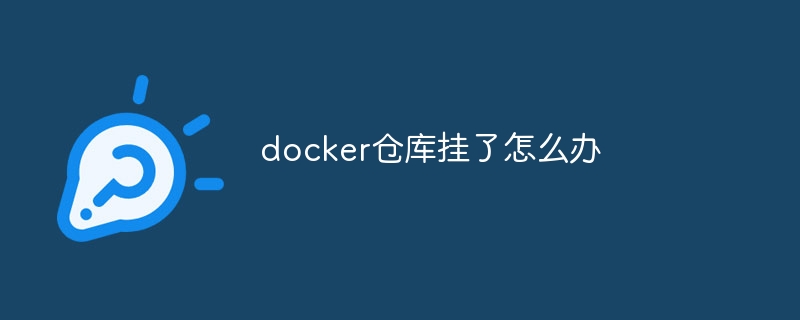What to do if the docker warehouse is hung
When a Docker repository is hung up, you can do the following: Check the network connection and restart the Docker service; use a local image or try to replace the repository; create your own repository or contact the repository provider.

What should I do if the Docker warehouse is hung?
When the Docker repository hangs, you can take the following steps to resolve the issue:
1. Check the network connection
- Make sure your computer is connected to the Internet.
- Try to use the ping command to check the connection to the Docker repository.
2. Restart Docker service
-
Restart the Docker service with the following command:
<code>sudo systemctl restart docker</code>
Copy after login
3. Use local mirroring
-
If possible, use a locally saved image. You can check the local image using the following command:
<code>docker images</code>
Copy after login
4. Use alternative repository
-
Try using an alternative Docker repository, for example:
- Docker Hub: https://hub.docker.com/
- Google Container Registry: https://gcr.io/
- Amazon Elastic Container Registry: https://aws.amazon.com/ecr/
5. Create your own repository
-
You can create a private repository to host your image. There are several popular options, such as:
- Docker Registry: https://docs.docker.com/registry/
- Harbor: https://goharbor.io/
- Nexus Repository Manager: https://www.sonatype.com/product/nexus-repository-manager
6. Contact the warehouse provider
- If the above steps do not work, you can contact your Docker repository provider to report the problem.
What should be noted is:
- If the problem is due to maintenance of the Docker repository, you need to wait for the problem to be resolved.
- It is always recommended to back up your image in case of such problems.
- Update Docker regularly to ensure you have the latest fixes and security updates.
The above is the detailed content of What to do if the docker warehouse is hung. For more information, please follow other related articles on the PHP Chinese website!

Hot AI Tools

Undresser.AI Undress
AI-powered app for creating realistic nude photos

AI Clothes Remover
Online AI tool for removing clothes from photos.

Undress AI Tool
Undress images for free

Clothoff.io
AI clothes remover

AI Hentai Generator
Generate AI Hentai for free.

Hot Article

Hot Tools

Notepad++7.3.1
Easy-to-use and free code editor

SublimeText3 Chinese version
Chinese version, very easy to use

Zend Studio 13.0.1
Powerful PHP integrated development environment

Dreamweaver CS6
Visual web development tools

SublimeText3 Mac version
God-level code editing software (SublimeText3)

Hot Topics
 1384
1384
 52
52
 How to use docker desktop
Apr 15, 2025 am 11:45 AM
How to use docker desktop
Apr 15, 2025 am 11:45 AM
How to use Docker Desktop? Docker Desktop is a tool for running Docker containers on local machines. The steps to use include: 1. Install Docker Desktop; 2. Start Docker Desktop; 3. Create Docker image (using Dockerfile); 4. Build Docker image (using docker build); 5. Run Docker container (using docker run).
 How to read the docker version
Apr 15, 2025 am 11:51 AM
How to read the docker version
Apr 15, 2025 am 11:51 AM
To get the Docker version, you can perform the following steps: Run the Docker command "docker --version" to view the client and server versions. For Mac or Windows, you can also view version information through the Version tab of the Docker Desktop GUI or the About Docker Desktop menu.
 How to create a mirror in docker
Apr 15, 2025 am 11:27 AM
How to create a mirror in docker
Apr 15, 2025 am 11:27 AM
Steps to create a Docker image: Write a Dockerfile that contains the build instructions. Build the image in the terminal, using the docker build command. Tag the image and assign names and tags using the docker tag command.
 How to update the image of docker
Apr 15, 2025 pm 12:03 PM
How to update the image of docker
Apr 15, 2025 pm 12:03 PM
The steps to update a Docker image are as follows: Pull the latest image tag New image Delete the old image for a specific tag (optional) Restart the container (if needed)
 How to save docker image
Apr 15, 2025 am 11:54 AM
How to save docker image
Apr 15, 2025 am 11:54 AM
To save the image in Docker, you can use the docker commit command to create a new image, containing the current state of the specified container, syntax: docker commit [Options] Container ID Image name. To save the image to the repository, you can use the docker push command, syntax: docker push image name [: tag]. To import saved images, you can use the docker pull command, syntax: docker pull image name [: tag].
 How to check the name of the docker container
Apr 15, 2025 pm 12:21 PM
How to check the name of the docker container
Apr 15, 2025 pm 12:21 PM
You can query the Docker container name by following the steps: List all containers (docker ps). Filter the container list (using the grep command). Gets the container name (located in the "NAMES" column).
 How to change the docker image source in China
Apr 15, 2025 am 11:30 AM
How to change the docker image source in China
Apr 15, 2025 am 11:30 AM
You can switch to the domestic mirror source. The steps are as follows: 1. Edit the configuration file /etc/docker/daemon.json and add the mirror source address; 2. After saving and exiting, restart the Docker service sudo systemctl restart docker to improve the image download speed and stability.
 How to copy files in docker to outside
Apr 15, 2025 pm 12:12 PM
How to copy files in docker to outside
Apr 15, 2025 pm 12:12 PM
Methods for copying files to external hosts in Docker: Use the docker cp command: Execute docker cp [Options] <Container Path> <Host Path>. Using data volumes: Create a directory on the host, and use the -v parameter to mount the directory into the container when creating the container to achieve bidirectional file synchronization.




